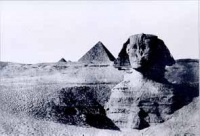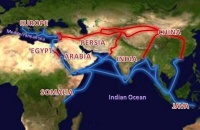North Africa
From The Art and Popular Culture Encyclopedia
|
Related e |
|
Featured: |
North Africa or Northern Africa is the northernmost region of the African continent, separated by the Sahara from Sub-Saharan Africa. Geopolitically, the UN definition of Northern Africa.
Culture
The people of the Maghreb and the Sahara regions speak various dialects of Berber and Arabic and almost exclusively follow Islam. The Arabic and Berber groups of languages are distantly related, both being members of the Afro-Asiatic family. The Sahara dialects are notably more conservative than those of coastal cities (see Tuareg languages). Over the years, Berber peoples have been influenced by contact with other cultures. Nubians, Greeks, Phoenicians, Egyptians, Romans, Vandals, Arabs, and lately Europeans. The cultures of the Maghreb and the Sahara therefore combine indigenous Berber, Arab and elements from neighboring parts of Africa and beyond. In the Sahara, the distinction between sedentary oasis inhabitants and nomadic Bedouin and Tuareg is particularly marked.
The diverse peoples of the Sahara are usually categorized along ethno-linguistic lines. In the Maghreb, where Arab and Berber identities are often integrated, these lines can be blurred. Some Berber-speaking North Africans may identify as "Arab" depending on the social and political circumstances, although substantial numbers of Berbers (or Imazighen) have retained a distinct cultural identity which in the 20th century has been expressed as a clear ethnic identification with Berber history and language. Arabic-speaking Northwest Africans, regardless of ethnic background, often identify with Arab history and culture and may share a common vision with other Arabs. This, however, may or may not exclude pride in and identification with Berber and/or other parts of their heritage. Berber political and cultural activists for their part, often referred to as Berberists, may view all Northwest Africans as principally Berber, whether they are primarily Berber- or Arabic-speaking (see also Arabized Berber).
The Nile Valley through northern Sudan traces its origins to the ancient civilizations of Egypt and Kush. The Egyptians over the centuries have shifted their language from Egyptian to modern Egyptian Arabic, while retaining a sense of national identity that has historically set them apart from other people in the region. Most Egyptians are Sunni Muslim and a significant minority adheres to Coptic Christianity. In Nubia, straddling Egypt and Sudan, a significant population retains the ancient Nubian language but has adopted Islam. The Republic of the Sudan is home to a largely Arab Muslim population, although there remains significant non-Arab (through Muslim) populations in the far north (Nubians), far west (Fur, Masalit and Zaghawa) and far south (Nuba) of Sudan.
North Africa formerly had a large Jewish population, almost all of whom emigrated to France or Israel when the North African nations gained independence. A smaller number went to Canada. Prior to the modern establishment of Israel, there were about 600,000-700,000 Jews in Northern Africa, including both Sfardīm (refugees from France, Spain and Portugal from the Renaissance era) as well as indigenous Mizrāḥîm. Today, less than fifteen thousand remain in the region, almost all in Morocco and Tunisia, and are mostly part of a French-speaking urban elite. (See Jewish exodus from Arab lands.)



